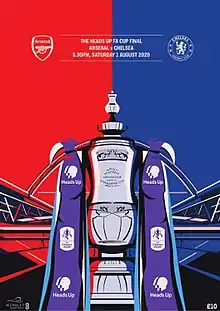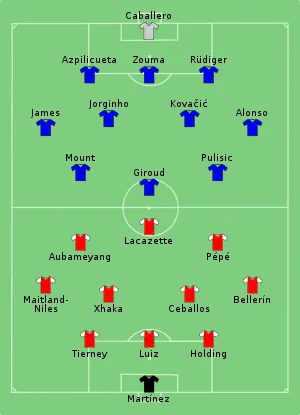2020 FA Cup Final
The 2020 FA Cup Final, known officially as the Heads Up FA Cup Final,[2] was the final match of the 2019–20 FA Cup and the 139th final of the FA Cup. It was played at Wembley Stadium, London, England on 1 August 2020; it was originally scheduled for 23 May but was delayed due to the COVID-19 pandemic in the United Kingdom.[3][4] The match was contested between Arsenal and Chelsea.[5] As winners, Arsenal entered the group stage of the 2020–21 UEFA Europa League.[6] The match was officially named the Heads Up FA Cup Final by The Football Association as part of a campaign around mental health awareness promoted by The FA president, Prince William, Duke of Cambridge.[2] The match was held behind closed doors.[7] The winners received the trophy on the pitch and not, as in previous seasons, by climbing steps to the Royal Box for the presentation.[8]
| Heads Up FA Cup Final | |||||||
|---|---|---|---|---|---|---|---|
 Match programme cover | |||||||
| Event | 2019–20 FA Cup | ||||||
| |||||||
| Date | 1 August 2020 | ||||||
| Venue | Wembley Stadium, London | ||||||
| Man of the Match | Pierre-Emerick Aubameyang (Arsenal) | ||||||
| Referee | Anthony Taylor (Cheshire)[1] | ||||||
| Attendance | 0[note 1] | ||||||
The match was broadcast live on both BT Sport and BBC. The latter's coverage received viewing figures of 8.2 million, making it the most watched football match of the season in the UK.[9]
Route to the final
Arsenal
| Round | Opposition | Score |
|---|---|---|
| 3rd | Leeds United (H) | 1–0 |
| 4th | Bournemouth (A) | 2–1 |
| 5th | Portsmouth (A) | 2–0 |
| QF | Sheffield United (A) | 2–1 |
| SF | Manchester City (N) | 2–0 |
| Key: (H) = Home venue; (A) = Away venue; (N) = Neutral venue | ||
Arsenal, as a Premier League club, started in the third round at home against EFL Championship side Leeds United. At their Emirates Stadium, Arsenal won 1–0 due with a goal from Reiss Nelson.[10] In the fourth round, they drew fellow Premier League Bournemouth away at Dean Court. Arsenal won 2–1 with goals from Bukayo Saka and Eddie Nketiah.[11] In the next round Arsenal were drawn away to League One side Portsmouth. At Fratton Park, Arsenal won 2–0 with goals from Sokratis and Nketiah.[12] In the quarter-finals, they drew fellow Premier League side Sheffield United. At Bramall Lane, Arsenal won 2–1 with a penalty from Nicolas Pépé and a stoppage time winner from Dani Ceballos.[13] In the semi-final at neutral Wembley Stadium, Arsenal played Premier League side and current FA Cup holders Manchester City. Arsenal reached the final after a 2–0 win with two goals from Pierre-Emerick Aubameyang.[14]
Chelsea
| Round | Opposition | Score |
|---|---|---|
| 3rd | Nottingham Forest (H) | 2–0 |
| 4th | Hull City (A) | 2–1 |
| 5th | Liverpool (H) | 2–0 |
| QF | Leicester City (A) | 1–0 |
| SF | Manchester United (N) | 3–1 |
| Key: (H) = Home venue; (A) = Away venue; (N) = Neutral venue | ||
Chelsea, as a Premier League club, started in the third round at home against Championship side Nottingham Forest and won 2–0 with goals from Callum Hudson-Odoi and Ross Barkley at their Stamford Bridge.[15] In the fourth round, they drew another Championship side, Hull City. At the KCOM Stadium, Chelsea won 2–1 with goals from Michy Batshuayi and Fikayo Tomori.[16] In the next round they were drawn with fellow Premier League club Liverpool at home and won 2–0 with goals from Willian and Barkley.[17] In the quarter-finals, they drew Premier League side Leicester City. At the King Power Stadium, Chelsea won 1–0 with the sole goal coming from Barkley.[18] In the semi-final at Wembley, Chelsea played Premier League side Manchester United in the cup for the fourth consecutive season. Chelsea reached the final after a 3–1 win with goals from Olivier Giroud, Mason Mount and an own goal from Harry Maguire.[19]
Pre-match
The two finalists shared a London derby rivalry. The final was a repeat of the 2002 and 2017 FA Cup finals, both of which Arsenal won. It was also a repeat of the previous year's UEFA Europa League final which Chelsea won.[20] Arsenal, having won a record 13 FA Cups, entered into the final looking to extend their winners record.[21] Due to the COVID-19 pandemic, the match was held behind closed doors with no spectators despite initial plans for a limited reopening.[7][22] Anthony Taylor was appointed to referee his second FA Cup final. Having refereed the 2017 final, he became the first man to referee a second FA Cup final since Arthur Kingscott in 1901; the FA did not want a referee's family to miss attending the match.[23] Arsenal manager Mikel Arteta and Chelsea manager Frank Lampard had won two and four FA Cups as players, respectively, for the clubs they managed in the 2020 final.
Match
Details
Arsenal
|
Chelsea
|
|
 |
| ||||||||||||||||||||||||||||||||||||||||||||||||||||||||||||||||||||||||||||||||||||||||||||||||||||||||||||||||||||||||||||||||||||||||||||||||||||||||||||||||||||||||||||||||
|
Man of the Match:
Assistant referees:[1]
|
|
Notes
- The final was played behind closed doors due to the COVID-19 pandemic in the United Kingdom.[7]
- Each team was given only three opportunities to make substitutions, with a fourth opportunity in extra time, excluding substitutions made at half-time, before the start of extra time and at half-time in extra time.
References
- "Referee Anthony Taylor and his team will take charge of the Heads Up FA Cup Final". The Football Association. 22 July 2020. Retrieved 22 July 2020.
- "2020 FA Cup final renamed Heads Up FA Cup final to promote mental health". BBC Sport. 11 June 2020. Retrieved 17 July 2020.
- "FA Cup final to be held on 1 August with quarter-finals resuming on 27 June". The Guardian. 29 May 2020. Retrieved 17 July 2020.
- "Watch: 2006 FA Cup Final Rewind - Liverpool win FA Cup on penalties". BBC Sport. 23 May 2020. Retrieved 9 September 2020.
Today should have been FA Cup final day
- "FA Cup semi-final draw: Man Utd vs Chelsea, Arsenal vs Man City". Sky Sports. 29 June 2020. Retrieved 17 July 2020.
- "Access List 20/24" (PDF). UEFA. Retrieved 17 July 2020. Cite journal requires
|journal=(help) - "When is the FA Cup 2019-20 final & will fans be allowed to attend?". Goal.com. Retrieved 20 July 2020.
- "FA Cup final: Winners to collect trophy on Wembley pitch". BBC Sport. 30 July 2020. Retrieved 1 August 2020.
- "FA Cup final on BBC sets viewing record for 2019-20 season with 8.2m". BBC Sport. 2 August 2020. Retrieved 16 August 2020.
- Begley, Emlyn (6 January 2020). "Arsenal 1–0 Leeds United: Reiss Nelson goal sends Gunners into fourth round". BBC Sport. Retrieved 18 July 2020.
- McNulty, Phil (27 January 2020). "Bournemouth 1–2 Arsenal: Arteta pleased with 'courageous' Gunners in FA Cup win". BBC Sport. Retrieved 18 July 2020.
- Begley, Emlyn (2 March 2020). "Portsmouth 0–2 Arsenal: Gunners ease into FA Cup quarter-finals". BBC Sport. Retrieved 18 July 2020.
- "Sheffield United 1–2 Arsenal: Dani Ceballos' late goal sends Arsenal to FA Cup semis". BBC Sport. 28 June 2020. Retrieved 18 July 2020.
- "Arsenal 2–0 Man City: Pierre-Emerick Aubameyang guides Gunners into FA Cup final". BBC Sport. 18 July 2020. Retrieved 18 July 2020.
- Emons, Michael (5 January 2020). "Chelsea 2–0 Nottingham Forest, FA Cup third round". BBC Sport. Retrieved 19 July 2020.
- Rose, Gary (25 January 2020). "Hull City 1–2 Chelsea: Blues edge Tigers to reach FA Cup fifth round". BBC Sport. Retrieved 19 July 2020.
- McNulty, Phil (3 March 2020). "Chelsea 2–0 Liverpool: Reds suffer second successive defeat". BBC Sport. Retrieved 19 July 2020.
- McNulty, Phil (28 June 2020). "Leicester City 0–1 Chelsea: Ross Barkley goal takes Blues into FA Cup semi-finals". BBC Sport. Retrieved 19 July 2020.
- McNulty, Phil (19 July 2020). "Manchester United 1–3 Chelsea: De Gea errors help settle FA Cup semi-final". BBC Sport. Retrieved 19 July 2020.
- "Arsenal to face Chelsea in 2020 FA Cup final". Football London. 19 July 2020. Retrieved 20 July 2020.
- "Chelsea eases past sleepy, error-prone Manchester United". NBC Sports. 19 July 2019. Retrieved 20 July 2020.
- "Manchester United and Man City fans could be able to attend FA Cup final at Wembley". Manchester Evening News. 31 May 2020. Retrieved 20 July 2020.
- "FA Cup Final: Anthony Taylor to referee second final". BBC Sport. 22 July 2020. Retrieved 1 August 2020.
- "Rules of the FA Challenge Cup competition" (PDF). The Football Association.
- "Minute's applause to be held ahead of all Emirates FA Cup quarter-finals". The Football Association. 25 June 2020. Retrieved 1 August 2020.